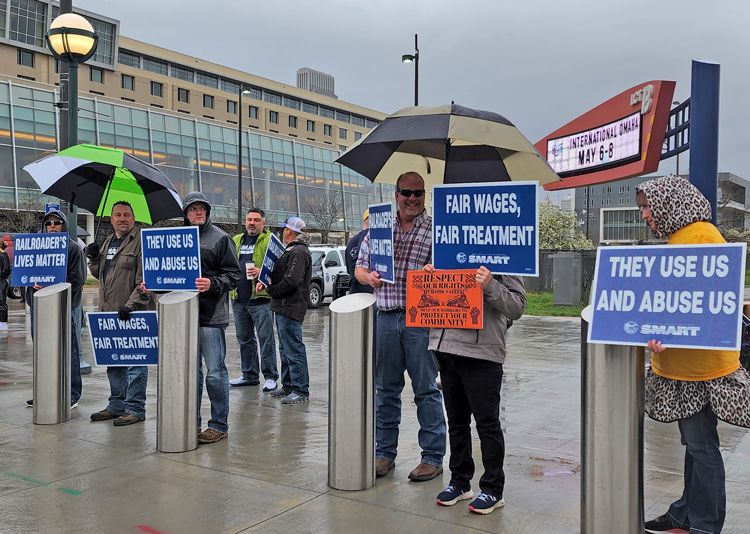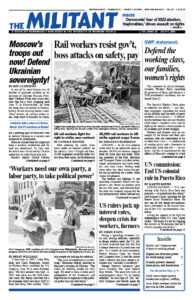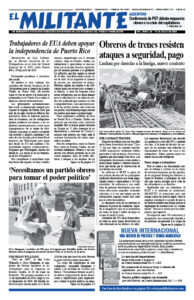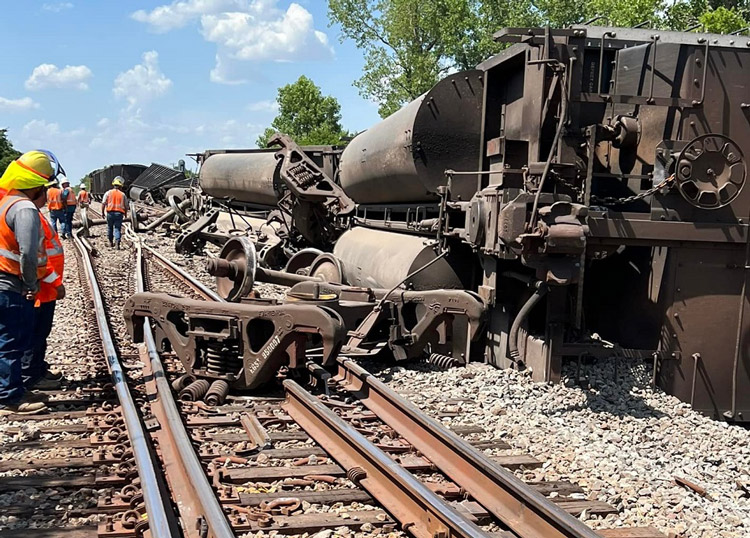After working for nearly three years under an expired contract on the nation’s Class 1 freight rail lines, 23,000 engineers received strike ballots from their union, the Brotherhood of Locomotive Engineers and Trainmen. But this doesn’t mean a strike is near. All rail workers are tied up with legal restrictions and miles of red tape that make calling a strike a challenge.
The BLET is part of United Rail Unions, the 11 main rail unions that are bargaining together, representing 140,000 members.
They face a coalition of rail bosses who are offering only small wage raises, while demanding workers pay higher costs for medical coverage. The profit-driven bosses’ key demand is to eliminate the conductor position on the trains, leaving the engineer alone in the locomotive running trains up to three miles long for up to 12-hour shifts.
Some 30% of the total workforce on these rail lines has been eliminated in less than a decade. The Class 1 railroads have driven their profits up to over 50%, and are determined to make more.
Over several decades of attacks, the bosses have cut rail operating crews from five to two. Now they want to run trains with just one worker. The job gets more and more dangerous, both for workers and for those who live near the tracks.
New attack on workers
This comes on top of draconian work rule and attendance changes put in place by Burlington Northern and Santa Fe Railway bosses earlier this year that wreak havoc with workers’ lives and families.
Pushed by their members, the BLET and conductors union SMART-TD prepared for a strike against this policy. But the company convinced a U.S. District Court judge that federal law bars a strike because the attendance policy was a “minor issue.” Not minor for the workers, of course.
Since then, some 700 conductors and engineers have quit their jobs at BNSF, leaving the bosses short handed and lengthening already strung-out delivery times. Container loads are laying in West Coast port waters and big rail yards in Chicago.
New hires are being put to work with only 10 to 12 weeks of training. Often workers only get 10 hours off before being called back to work. To miss a call threatens your job.
This author was on duty a total of 17 hours in one shift last week because the company didn’t want to pay for a cab to our destination to rest, in addition to 15 hours four days earlier for the same reason.
Rail jobs used to be considered good jobs, and ran in families. But that’s changed. “You give up so much when you work for the railroad, but it impacts your family even more,” 30-year-old Brady Wassam, who left his job as a BNSF engineer, told the Montana Free Press. For years he never knew if he’d be home for holidays and other special events.

“The only thing faster than a speeding bullet is how fast rail workers are quitting because of the unsafe working conditions and rail bosses’ daily harassment,” Lance Anton, a railroad conductor in Lincoln, Nebraska, told the Militant by phone June 20. “From my experience, most of the rail union members I talk to want to fight for better work conditions. We’re told we’re essential to move the freight, then we should have the right to work safely without being pushed to work faster.
“Rail workers have become second to the huge profits being paid out to stockholders,” he said. “We need to organize, mobilize all rail workers into one big industrial union to fight for workers control over road and yard service.”
Under these conditions, the danger of deadly derailments grows. One freight train derailed June 23 in Marlin, Texas.
Then, four days later, an Amtrak passenger train running from Los Angeles to Chicago hit a dump truck at an unmarked crossing and derailed outside Mendon, Missouri, killing four and injuring at least 150 more.
Area farmers had been complaining for years about the crossing and neither the railroad nor area authorities have done anything. “We have to cross this with farm equipment to get to several of our fields,” Mike Spencer told the Kansas City Star. “We have been on the railroad for several years about fixing the approach by building the road up, putting in signals, signal lights or just cutting the brush back.”
“They knew it was unsafe,” he added. “That was pretty much a no-brainer.” He said some 85 trains run through every day.
The 1926 Railway Labor Act — passed with bipartisan support after 400,000 rail workers went on strike four years earlier — was designed to aid the rail bosses and make strikes as difficult as possible.
‘We need the right to strike’
“The law is designed to tie us in knots and keep us from using the only power we have, the power to collectively withhold our labor,” Seattle conductor and SMART-TD member Henry Dennison told the Militant June 25. Dennison is also the Socialist Workers Party candidate for U.S. Senate from Washington state.
“We need to fight to be able to bring our strength in numbers and labor solidarity to bear. These anti-labor laws need to be swept aside,” Dennison said. “This is the biggest obstacle we face — we as workers don’t have political power. We need to build our own party, a labor party, based on fighting unions.”
“We should fight for a maximum of 50-car trains and four-person crews — an engineer and a conductor up front and two conductors in the back,” says Dennison. “We need this for safety, to lessen the burden of the work and make it possible to seriously train new workers.”
“Ultimately,” Dennison explains, “the future of humanity depends on the working class developing a respected leadership and leading our allies to take power to build a workers and farmers government, based on the needs of all those oppressed and exploited by capitalism.”
Candace Wagner is a freight rail conductor and member of the BLET union. She is the Socialist Workers Party candidate for governor of Pennsylvania.


